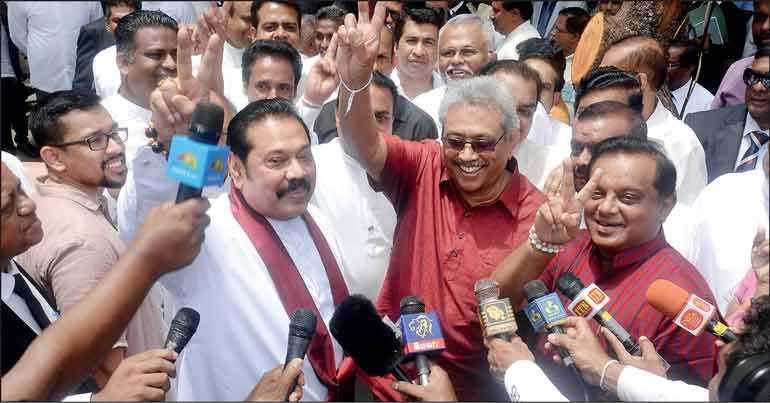Tuesday Feb 17, 2026
Tuesday Feb 17, 2026
Wednesday, 30 September 2020 00:00 - - {{hitsCtrl.values.hits}}

GR-MR equation works on a simple formula: harder they hit the Tamils stronger would be the support to the regime from Sinhala Buddhists, and harder they hit Muslims happier and more beneficent would be Modi – Pic by Shehan Gunasekara
One of the most unsettling international impacts of the global COVID-19 pandemic is the rise of an anti-China coalition led by Trump’s America. In the Asian region India is the most powerful member of this  coalition, and it is through India that US is trying to checkmate China’s regional challenge and her economic dominance through her One Belt One Road strategy.
coalition, and it is through India that US is trying to checkmate China’s regional challenge and her economic dominance through her One Belt One Road strategy.
With mounting economic difficulties at home, as illustrated by Moody’s downgrading of the economy by three notches from B2 to Caa1, and pressure from the West, Sri Lanka has no choice but to keep its relations with China unchanged at present level at best, while boosting its ties with neighbouring India. This explains why GR flew to meet Modi immediately after his victory, and why MR is now bending backwards and doing everything possible to please his Indian counterpart to seek more economic assistance. Economically therefore, Sri Lanka is too vulnerable a nation.
Already, the country is in debt to India to a total of $ 960 million, and only recently the two central banks entered into a currency swap arrangement for $ 400 million. Negotiations are now under way for another bilateral currency swap worth $ 1.1 billion. Lately, Prime Minister Modi has also promised $ 15 million to promote ‘Buddhist ties’ between the two countries.
A couple of months ago he invited Buddhist pilgrims from Sri Lanka to visit Kushinagar, the new airport in Uttar Pradesh, the state from where Modi built his political capital by engineering a pogrom against Muslims, massacring 2,000 of them in Gujarat in 2002. Modi’s India, through increasing economic ties under the ‘neighbourhood first’ policy is tightening its hold over Sri Lanka. Behind India of course is US. GR-MR power cartel has no choice but to succumb to Indo-American pressures.
Unfortunately, in this growing friendship, the long-awaited implementation of the 13th Amendment is quietly being ignored by both parties, India and Sri Lanka. Among the rulers and their backers in Sri Lanka in particular, there is a growing triskaidekaphobia or fear of number 13, because of the perceived dangers of losing to Tamils by implementing the 13th Amendment, which was originally inserted under Indian pressure.
On the Indian side, why didn’t Modi, in spite of the betrayal by the Sri Lankan President, who undertook to implement that amendment but reneged after returning to Colombo, at least show some urgency or make its implementation conditional upon further economic assistance in his recent discussions with MR? Instead, his almost ethical advice calling GR-MR regime to address the “aspirations of the Tamil people for equality, justice, peace and respect within a united Sri Lanka, by carrying forward the process of reconciliation with the implementation of the 13th Amendment to the Constitution”, and MR’s dismissal of that advice but couching it diplomatically under a non-committal undertaking to “work towards realising the expectations of all ethnic groups, including Tamils, by achieving reconciliation nurtured as per the mandate of the people and implementation of the constitutional provisions” (Sunday Times, 27 Sept. 2020), illustrates that Modi is prepared to downplay its implementation for the sake of gaining greater strategic and economic benefits to his country.
First of all, Modi’s own position as Prime Minister is not going to be affected even by an iota by sacrificing the interests of Sri Lankan Tamils. Tamil leadership at home expects Tamil Nadu to be the broker between Delhi and Colombo. But Modi had demonstrated at the last election that he could capture Delhi without the support of Tamil Nadu. Tamil Nadu is therefore no more a trump card to pressure Delhi by Sri Lankan Tamils.
Secondly, Indian capitalists would be too happy to welcome Modi’s Indo-Lanka negotiations, if they  open more opportunities for the moneyed class to enter Sri Lankan market, and acquire tangible assets through investment. Sri Lanka’s current economic plight and desperation for Indian economic assistance obviously opens a window of opportunity for Indian recolonisation. Why should the Tamil factor be allowed to be an obstruction to this imperial objective? Even geo-strategically China could be checkmated in the Indian Ocean with the assistance of America and its Western allies. It would be suicidal for Sri Lanka to ignore this reality.
open more opportunities for the moneyed class to enter Sri Lankan market, and acquire tangible assets through investment. Sri Lanka’s current economic plight and desperation for Indian economic assistance obviously opens a window of opportunity for Indian recolonisation. Why should the Tamil factor be allowed to be an obstruction to this imperial objective? Even geo-strategically China could be checkmated in the Indian Ocean with the assistance of America and its Western allies. It would be suicidal for Sri Lanka to ignore this reality.
Thus, with a disunited opposition unable to win the Sinhalese Buddhist masses to its side, and with ‘native informers’ among Tamils and Muslims, who are prepared to work with the GR-MR power cartel, the 13th Amendment is fated to be buried under the ashes of the current battle over constitutional amendments. This battle will be another win to the regime, unless the five Supreme Court judges decide otherwise. Of course, there is a referendum to go through even after clearance by the judges. To win that referendum GR is working overtime to maintain his populist image among Buddhist voters. His last visit to Haldumulla, one of the most backward villages in Uva Province, is an example of this populist exercise.
The net losers are the Tamils. Perhaps, it was with this outcome in mind that GR said, soon after he was elected as President, that the solution to the Tamil issue is not devolution of power but economic development. How could Modi and his capitalists quarrel with that when development would open opportunities for Indian penetration and investment?
A footnote to the Tamil problem is that of Muslims. If Tamils could be subdued, Muslims could be enslaved to please Modi. GR-MR equation works on a simple formula: harder they hit the Tamils stronger would be the support to the regime from Sinhala Buddhists, and harder they hit Muslims happier and more beneficent would be Modi. MR’s ban on cow slaughter, the celebrated One Law One Country mantra targeting the so-called sharia laws particularly in relation to Muslim marriage and divorce, controversy over madrasas and Muslim religious education, and the overall anti-Muslim sentiment nurtured by Buddhist supremacists, are all instruments to hit the Muslim community and cripple its economy.
To the Tamils at least there is a vibrant transnational community that is prepared to voice their grievances at international fora. To the Muslims, there is none. The much talked about Islamic brotherhood and universal Muslim umma are just historical fictions without any practical benefits to Muslim minorities everywhere.
Thus, as Modi-GR-MR relations improve the two minorities stand to suffer. However, everything depends on how long would Sinhala Buddhist masses are prepared to put up with the economic costs of religious ethnic discontent kept burning by the current regime. With worsening economic difficulties arising out of a flat bottom, dish-shaped growth curve the regime will find it impossible to deliver its promise of ‘prosperity and splendour’. Of course, there is no time limit set to deliver this
promise.
However even to maintain the status quo will be a challenge within the current recessionary environment. Indian generosity through currency swaps, moratorium on debt servicing and investment can only postpone the day of reckoning but cannot avoid it. Without twin surplus in budgets and balance of payments over successive years, Government will have no funds to invest in economic development.
To raise Government revenue through taxes and to increase exports while rationalising imports will be a great challenge. Import substitution is no permanent cure and to borrow more is suicidal. In short, the economy will remain the number one enemy of this regime. The regime may fool some people all the time and all people some time, but not all people all the time.
(The writer is attached to the School of Business and Governance, Murdoch University, W. Australia.)